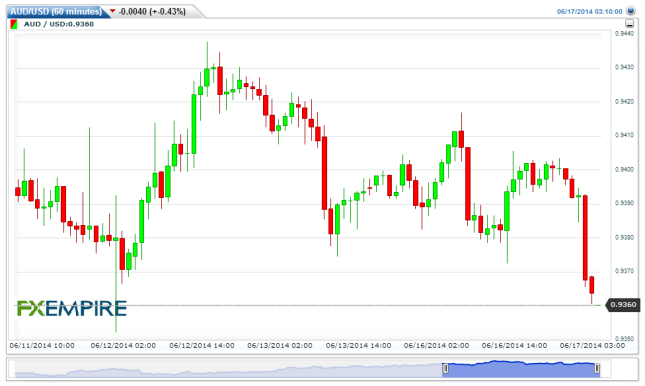Wall Street showed a lack of direction throughout the trading day on Monday as trader weighed worries about the deteriorating security situation in Iraq against a batch of upbeat U.S. economic data. The modest strength seen at the close of trading partly reflected a positive reaction to better than expected readings on New York manufacturing activity, industrial production, and homebuilder confidence. The choppy trading came on the heels of the pullback seen last week. Meanwhile, the European stocks edged down for a second consecutive session on Monday, even as tame inflation data raised expectations for further stimulus from the European Central Bank. Final data from Eurostat showed that inflation eased to 0.5% in May from 0.7 % in April. The rate came in line with the flash estimate published on June 3. All leading American indices including the Dow Jones Industrial Average, NASDAQ index and the S&P 500 (SPX) ended in green. The Dow was up by 0.03% and closed at 16781; the S&P 500 gained 0.08% at 1938. European indices ended in red. The FTSE was down 0.34%, the DAX shed 0.29% and the CAC 40 was down by 0.73%.
This morning Asian stock markets are trading mixed. The Shanghai Composite is down 0.74% at 2071 and the Hang Seng is down by 0.36% at 23217. Japan’s Nikkei is up by 0.50% at 15008 and Singapore’s Singapore Straits Time down by 0.39% at 3278.
Tuesday morning traders are dealing with disappointing data from China. A report that investment into China unexpectedly declined weighed heavily on Asian traders. In Australia the minutes from the RBA meeting surprise with dovish comments from the central bank. Australia’s central bank said it’s hard to gauge how much low interest rate will offset a drop in mining investment and tighter fiscal policy, adding that the currency was providing less assistance to rebalancing growth. “Those uncertainties were likely to take some time to resolve,” the Reserve Bank of Australia said in minutes today of its June 3 meeting, where it kept the benchmark cash-rate unchanged at a record-low 2.5 percent. “The expectation of substantial falls in mining investment, below-average growth of public demand and non-mining investment remaining subdued for a time implied that the pace of growth was likely to be a little below trend over the rest of this year and into next.” The Australian Dollar declined by 45 points to trade at 0.9355 after nearing its highest point before the release of the minutes. The New Zealand dollar is also in the red after breaking the 87 price level for the second time since the RBNZ increased interest rates. The kiwi is trading at 0.8624.

The Japanese yen continued to climb on Monday as violence in Iraq spurred concerns oil supplies will be disrupted and bolstered the appeal of haven assets. Japan’s currency touched the strongest level in four months against the euro after Iraq’s military attacked insurgents who had captured territory north of Baghdad. This morning the JPY is in down against the greenback and the euro, trading at 102.03 and 138.42 respectively.
